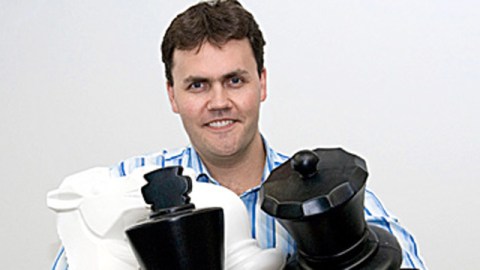Jesse Schell: Trying to Make a Video Game That Listens

“I think the primary technological barrier that keeps us from being more emotionally engaged with video games is the barrier of speech,” says Jesse Schell, the video game designer and CEO of Schell Games. “Computers can talk, they have sound, they can take touch inputs, they have cameras—but one of the things they really can’t do is listen to us.” Schell says that once you can have a meaningful conversation with an artificially created video game character with just your voice, “the potential for this to be an emotional medium rapidly grows and just expands, and it will suddenly become incredibly more natural.”
In his Big Think interview, Schell spoke about how video games are evolving to make people’s lives better, saying that games will likely be at the forefront of self-improvement in the coming years. “You talk to wealthy people who have a personal trainer, and they talk about how effective it is,” says Schell. Now, with games, “everyone will be able to have that kind of personal trainer, not only just for physical things and exercise but for their education, their hobbies, for their art, for their spirituality, for anything in their life that they’d like to improve at.”
Schell also speaks about the popularity of massively multiplayer online games, saying that one of the reasons people like them so much is that the games give you concrete achievement, and have a kind of persistence of engagement. “Traditional video games, you play them, you win them, it’s kind of over. You turn it off, and it’s gone,” says Schell. “These massively multiplayer games are persistent. You become level nine and you turn it off for three months—you come back, and you’re still a level nine. You can go to level 10. These can become something that you do for 10 years, 20 years, 50 years if you want to. People like that; it makes it more solid, it makes it more real, it makes it more meaningful.”
Could virtual currencies revolutionize online advertising and marketing? Schell thinks so: “Advertisers are going to realize … the ways they can tap into these virtual economies as we become more and more connected,” says Schell. People think that these virtual economies are isolated, he says, but “advertisers are going to start to see that ‘Wow. These currencies mean something to people. People put in hours and hours of their lives trying to build up this currency. How can we have them engage with our brand, purchase our products, spread the word about our new products, give reviews to our products, et cetera. and reward them with these virtual currencies?'”





